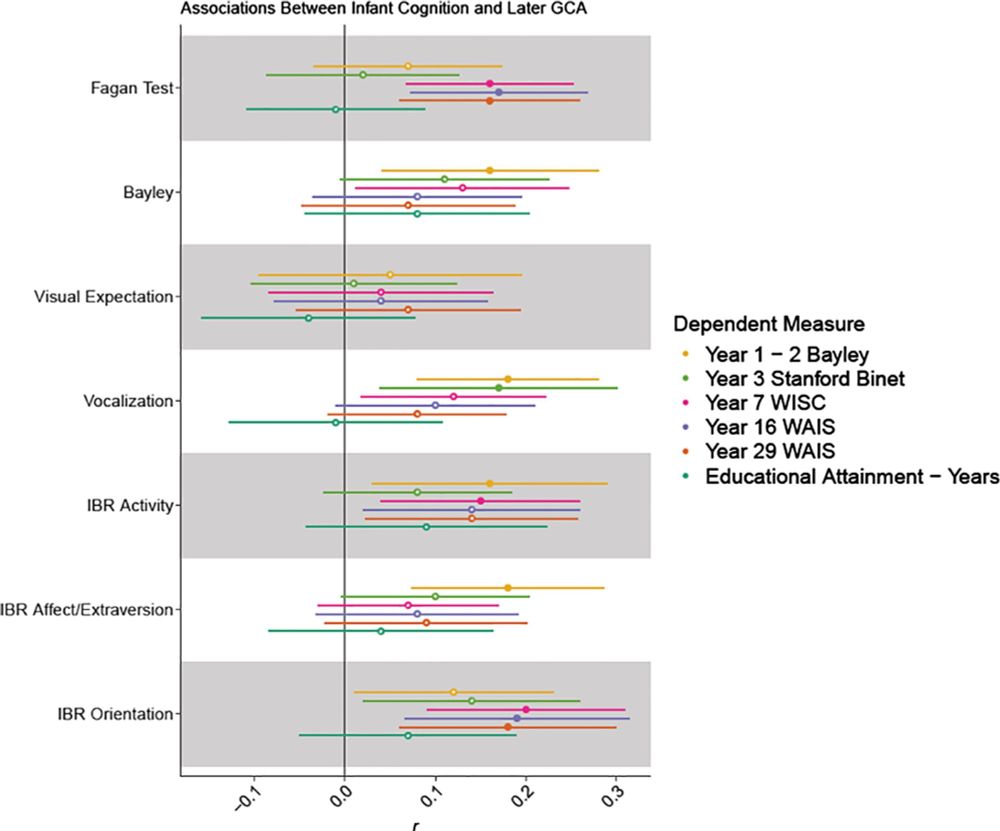OSF
New pre-print online: Imputing parental genotypes through Mendelian Imputation: Ethical and Legal Considerations
osf.io/preprints/ps...
01.08.2025 12:53 — 👍 13 🔁 7 💬 2 📌 3
The twin work also showed that shared environment from year 1-2 predicted 10% of the variance in adult GCA, highlighting the lasting impacts of the infant environment.
Thank you to all our coauthors and the Colorado Longitudinal Twin Study participants. 4/4
30.05.2025 15:21 — 👍 0 🔁 0 💬 0 📌 0
We used twin studies & polygenic indices (PGIs/PGSs) which showed a rapid increase in the stability of GCA between ages 1 and age 7. Half of the variance in adult GCA was explained by genetic influences at age 7 or earlier, and two-thirds was explained by genetic influences at age 16 or earlier. 3/4
30.05.2025 15:19 — 👍 0 🔁 0 💬 0 📌 0
Two measures of infant cognition (a test of novelty preferences and tester-rated task orientation) given at age 7 and 9 months predicted general cognitive ability (GCA) nearly 30 years later. 2/4
30.05.2025 15:17 — 👍 0 🔁 0 💬 0 📌 0
Postdoctoral Associate
Link below for a postdoc position for an NIH project evaluating whether music engagement is protective for adolescent substance use. The project is led by
@dangustavson.bsky.social and focuses on twin/family and polygenic score analyses of existing datasets.
jobs.colorado.edu/jobs/JobDeta...
24.09.2024 15:41 — 👍 8 🔁 4 💬 0 📌 0

I was awarded my first R01 grant last week! I'm really looking forward to taking another deep dive into the science of musicality in the coming few years in two very important datasets (CATSLife & ABCD).
I will also be looking for a postdoc (or potentially a PhD student to help with this project)!
21.08.2024 14:43 — 👍 14 🔁 2 💬 6 📌 0
Great science so far at #BGA2024! With @psychgenomics.bsky.social @dangustavson.bsky.social @michelnivard.bsky.social @dr-appie.bsky.social, and who else here…?
28.06.2024 03:49 — 👍 4 🔁 1 💬 0 📌 0
Twin analysis show the association between brain age and EF decline was explained mostly by genetic influences and some nonshared environmental influences. Brain age is highly heritable (~62%), but heritability of EF changes are much smaller (19%)
10.06.2024 19:08 — 👍 0 🔁 0 💬 0 📌 0
APOE also predicts of executive function changes between 56 and 68, but it did not interact with brain age. Cognitive reserve also did not interact with brain age to predict EF changes.
10.06.2024 19:08 — 👍 0 🔁 0 💬 1 📌 0
I'm curious what others think, but I feel we need to be more careful about including 'proxy' phenotypes in big GWASs of psychiatric disorders. The power for some genetic effects is definitely better but it may wash our or even hide other important genetic variation
13.05.2024 17:07 — 👍 0 🔁 0 💬 0 📌 0
There are a lot of dimensions mixed in the could cause differences (self-report vs. clinician, continuous ratings vs. case-control, etc.), but our findings are consistent across GWAS and twin/family approaches
13.05.2024 17:06 — 👍 0 🔁 0 💬 0 📌 0
APA PsycNet
We published a new study showing the genetic influences on depression/anxiety disorders are NOT identical to those on self-reported measures of loneliness, well-being (etc.)
psycnet.apa.org/record/2024-...
13.05.2024 17:06 — 👍 2 🔁 0 💬 2 📌 0

Yesterday I taught my first lecture at the International Statistical Genetics Workshop (on gene-environment correlation). I'm very grateful to be part of this group!
08.03.2024 16:59 — 👍 11 🔁 3 💬 2 📌 0
Thanks for the invite @breunigsophie.bsky.social! Now that I'm here I guess this really is the official place for hot new science news...
15.12.2023 15:48 — 👍 5 🔁 0 💬 0 📌 0
PhD Candidate | GxE Interplay of cognitive development and educational attainment at Max-Planck Research Group „Biosocial“
"Ah, I am wandering! Strange how the brain controls the brain!" Neuroscientist at the University of Michigan. Data Sleuth. #ARM. "Confoundoisseur". Unquestionably eccentric. Views are my own.
Linguist, cognitive neuroscientist and wannabe geneticist. Associate Professor at University of Iceland. Views are my own. https://uni.hi.is/rosas and https://english.hi.is/staff/rosas
Assistant Professor @TAMU. Aging, Cognitive Control, Alzheimer's Disease, Non-pharmacological Interventions 🧠🍨🫖🍰. Views are my own.
she/her/ella|ASERT/IRACDA Postdoctoral Fellow at the University of New Mexico|Research interests include behavioral neuroscience, genetics, addiction, and reward 🐭🥃
Postdoctoral researcher at the Institute for Molecular Medicine Finland (FIMM), HiLIFE, University of Helsinki. @fimm-uh.bsky.social
PhD researching the genetic underpinnings of chronic pain and substance use disorders
psych professor, MSU. personality and environments and genes and the tangle all between! Also music opinions! tedmond.net
Official Bluesky account for the University of Colorado Boulder. AAU member. https://www.colorado.edu/ #CUBoulder #BeBoulder #GoBuffs #SkoBuffs
Developmental psychologist at QMUL. Director of the Cognition, Development and Education research lab (http://codelab.science). Mum of 2. She/her
Psychology, psychiatry, statistics, sleep, genomics, genetics, armchair science philosophy.
Postdoc @ IBG, Colorado. Research interests: ageing, frailty, dementia, genetic epidemiology & preventive medicine.
Posts: personal capacity. PSY/open science, working memory, attn, mindwandering (also edu; skepticism). Living well with #Tourette. (Also am/was ProfessorPowerPop on Xitter.) Art: Miles Johnston; Haring
PhD Candidate in Statistical Genetics @ VU Amsterdam. Organizer for R-Ladies Amsterdam. Tidyverse Enthusiast.
https://josefinabernardo.github.io/personal-website/
Individual differences in learning and decision-making in relation to mental health and resilience in daily life. Postdoc @Donders Institute, Radboud University, Nijmegen NL / Asst Prof @Institute of Psychology, ELTE, Eötvös Loránd University, Budapest HU
Life course mental health researcher • Interested in longitudinal & genetically sensitive methods, inequalities and comorbidity • Lecturer at University of Sussex • She/Her
https://profiles.sussex.ac.uk/p300252-ellen-thompson/about
Research genetic counsellor. PhD in Science Communication.
Researching equitable genomic testing & genetics of neurdevelopmental disorders.
https://substack.com/@jonathanrob1985?utm_source=user-menu
👨💻 github.com/lf-araujo/workbenchless
🎓 @unimelb
🧪@cidacs







